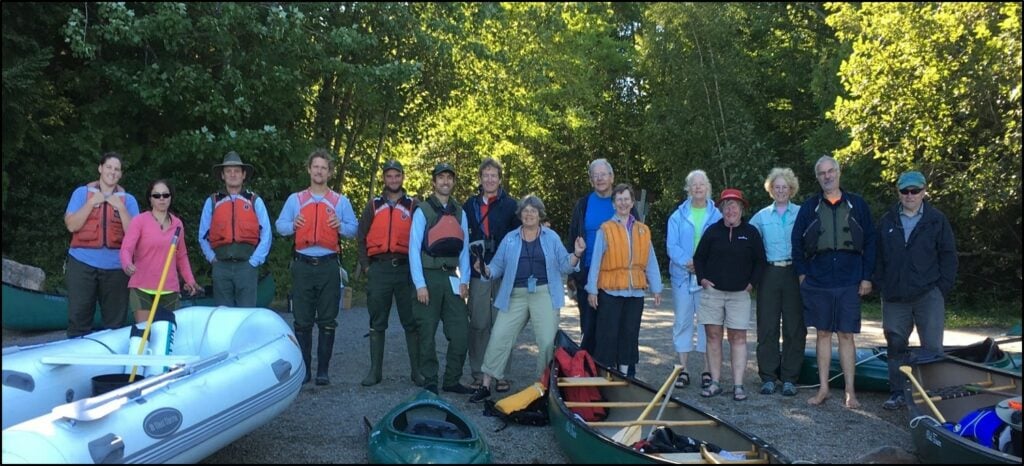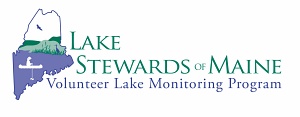
Quick Links
Volunteer Programs & Tools
Latest News from LSM
Forms & Data Sheets
IPP Workshops
Lake Stewards of Maine offers a variety of free Invasive Plant Patrol (IPP) workshops. IPP Workshops are designed to teach volunteers how to look for suspicious plants, determine native from invasive species, and how to properly survey and report findings.
IPP volunteers are crucial to LSM’s work monitoring for aquatic invasive species. On this page volunteers can find out details, dates, and registration links for both in-person and online IPP workshops.
Online Workshops
Invasive Plant Patrol 101
Learn about how to identify each of Maine’s 15 potentially invasive plants and their native lookalikes, proper surveying methods and how to organize an invasive plant patrol team, and how to properly report and submit findings. This class is required for those seeking Tier 2 Certification by Lake Stewards of Maine. An accompanying review quiz will be required for certification.
Date: May 9, 9am – 12 pm
IPP Travel Team Webinar – June 19
Lake Stewards of Maine (LSM) will host a webinar and information session on the IPP Travel Team on Wednesday, June 19 at 9:00 am
LSM’s IPP Travel Team is new initiative which aims to bring invasive plant patrollers of all skill levels around the state to help survey for aquatic invasive species (AIS). The Travel Team welcomes anybody who wants to get outdoors, see beautiful and serene Maine lakes, and monitor for invasive plants and animals beyond their home lakes. In this webinar, novice and experienced IPPers can learn about the many ways they can help, learn about what LSM can offer Travel Team volunteers, see this season’s Travel Team locations, and ask questions of LSM’s AIS staff.
Invasive Plant Patrol 101
Learn about how to identify each of Maine’s 15 potentially invasive plants and their native lookalikes, proper surveying methods and how to organize an invasive plant patrol team, and how to properly report and submit findings. This class is required for those seeking Tier 2 Certification by Lake Stewards of Maine. An accompanying review quiz will be required for certification.
Manual Control Methods
This webinar outlines a variety of manual control methods for aquatic invasive plants present in Maine. Guests will learn about basic biology and identifying characteristics for a variety of known aquatic invasive species (AIS) and their native lookalikes, how to manually remove AIS safely and effectively, and Maine permitting and reporting requirements for manual control methods.
In-Person Field Workshops
Plant Paddles
Plant Paddles are hands-on, outdoor workshops where volunteers discover how to look for suspicious plants. Guests will learn about the threats of aquatic invasive plants, how to find and pull specimens, how to determine whether a plant is suspicious or not with a Quick Key (link here?), and how to report findings. Plant Paddle guests should be comfortable on water in small craft.
Plant Paddle attendees are eligible for Tier 1 certification .
Live Plant ID
Live Plant ID classes are indoor classes where volunteers can gain experience identifying a number of common aquatic native and invasive plants. Guests gain an understanding of plant structure, biology, classification, and learn how to identify plants using a Field Guide.
Plant Paddle attendees are eligible for Tier 2 certification .
Advanced Plant ID
Advance Plant ID classes are for those who are serious about identifying aquatic plants. In these classes, guests learn expert-level identification techniques for a large and diverse array of Maine’s native and invasive aquatic flora.
Advance Plant ID attendees are eligible for Tier 3 certification. Advance Plant ID classes are not being offered in 2024.
**REGISTRATION FOR ALL IPP FIELD WORKSHOP**
Click here to register for a Plant Paddle or Live Plant ID class. Please choose your desired class and date on this form.
LSM has a variety of supplemental video trainings available. These webinars provide specialized information useful to IPPer volunteers, including trainings about specific groups of plants, survey techniques, and more.
